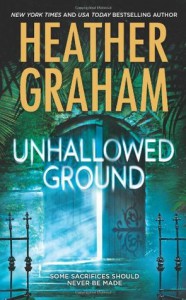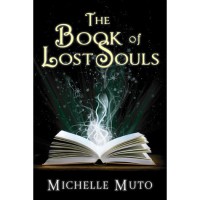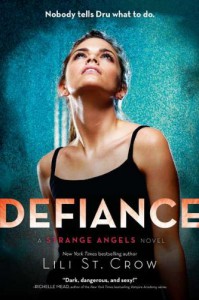Kait's Escape
I like to read about ass kicking and happily ever after.
 I liked the concept of this book, but it felt like the romance was not well planned or believable and there were no real seeds to who the killers were planted earlier in the book. It felt like their identities were totally pantsed in a "ooh wouldn't it be cool if it was these people?" without the necessary groundwork to make it truly believable. The Dead Room was much much better.
I liked the concept of this book, but it felt like the romance was not well planned or believable and there were no real seeds to who the killers were planted earlier in the book. It felt like their identities were totally pantsed in a "ooh wouldn't it be cool if it was these people?" without the necessary groundwork to make it truly believable. The Dead Room was much much better.
Deadlands Hunt
 I've been needing to dive back into something meant for grown ups after a steady diet of YA and this was just the ticket. It's a fast, action packed romp that's very...Firefly meets Tolkein meets [insert your favorite western movie]. I've definitely never read anything quite like it. The heroine, Amethyst, has a spine of steel, and of course I've always got a soft spot for sexy alpha werewolves--Chase doesn't fail to deliver. All in all, a fun read.
I've been needing to dive back into something meant for grown ups after a steady diet of YA and this was just the ticket. It's a fast, action packed romp that's very...Firefly meets Tolkein meets [insert your favorite western movie]. I've definitely never read anything quite like it. The heroine, Amethyst, has a spine of steel, and of course I've always got a soft spot for sexy alpha werewolves--Chase doesn't fail to deliver. All in all, a fun read.
 Love. Love. Love. Well there were about twenty pages where I hated, but it turned out all right in the end, so I forgave Myra. Can't wait for the rest of this series. Totally loved Emerson and Michael and Kaleb, and I really dug the setting. Ivy Springs feels like one of the small Southern towns I grew up in rather than the big city settings so often favored in fiction. Charming. And I totally want one of those empanadas from Murphy's Law...
Love. Love. Love. Well there were about twenty pages where I hated, but it turned out all right in the end, so I forgave Myra. Can't wait for the rest of this series. Totally loved Emerson and Michael and Kaleb, and I really dug the setting. Ivy Springs feels like one of the small Southern towns I grew up in rather than the big city settings so often favored in fiction. Charming. And I totally want one of those empanadas from Murphy's Law...
 So here's the thing I have learned as a teacher. Part of your job is to explain things repeatedly, in as many different ways as possible, until your audience understands whatever concept you're trying to teach them. This is something I often struggle with, as I tend to understand things intuitively in a "Yeah, you know, it's like...and stuff..." kind of way. My math teachers in grade school used to think I was cheating because I didn't show my work. I did it all in my head. On a professional level, I understand my subject and it seems simple and easy to me, so when my students don't get it the first or second time, I often have a really hard time coming up with some other means of explaining.
So here's the thing I have learned as a teacher. Part of your job is to explain things repeatedly, in as many different ways as possible, until your audience understands whatever concept you're trying to teach them. This is something I often struggle with, as I tend to understand things intuitively in a "Yeah, you know, it's like...and stuff..." kind of way. My math teachers in grade school used to think I was cheating because I didn't show my work. I did it all in my head. On a professional level, I understand my subject and it seems simple and easy to me, so when my students don't get it the first or second time, I often have a really hard time coming up with some other means of explaining.Not so with Larry Brooks. There are so many analogies in this book that you could make a drinking game out of it. Take a shot for every new metaphor, and you'll be hammered by the end of chapter 3. This is the mark of a great teacher. If you don't "get it" by the time you finish this book, you're brain damaged.
It is a MUST BUY, MUST READ, MUST HAVE for every writer, no matter whether you are a pantser or plotter. It will change your writing life, alter the way you see story (in books, movies, TV, or plays) forever. You can never got back to NOT understanding it because in these 278 pages Brooks lays out the core foundation of good story, without which you don't have a prayer of getting published (unless your Tarantino and sold your soul to the devil).
The book covers (as the title implies) the 6 core competencies. They are:
Concept
Character
Theme
Structure
Scene Execution
Writing Voice
Now I think we all intuitively understand at least SOME of these things on a gut level. Some better than others. We all have different natural strengths. But what this book will do for you is illuminate the dark corners and show you, not only where the weak spots ARE, but how to fix them.
I cannot say enough positive things about this book. Brooks' conception of story structure (which I initially read in a series of posts on Storyfix, then later in a more detailed ebook) literally changed my writing life. I used to have stellar beginnings and kick ass endings and schlumpy middles. I used to refer to it as The Dreaded Valley of the Shadow of the Middle because I was lost. My friends, now I am found. These concepts lit the way so thoroughly that the section of the book I once dreaded now I LOOK FORWARD TO.
Every section of Story Engineering has wisdom to impart. It isn't the kind of inspirational craft book you pick up and breeze through in a day or two. It is, or should be, a slow read, one where you take your time reading through and really think over the content, applying it to your work. Then you'll want to read it again. You'll want your sticky tabs, highlighter, and post it notes handy when you read it. Mine copy is starting to look like a porcupine. But hey, I can attest, the binding is good!
I'll stop waxing poetic here and just end with this: BUY THIS BOOK TODAY.

















